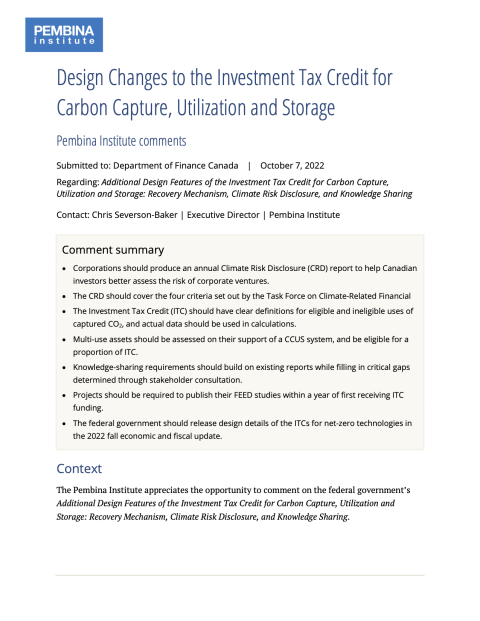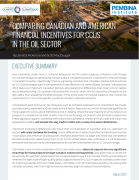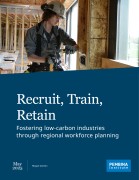In October 2022, the Pembina Institute submitted comments to the Department of Finance Canada on the proposed design of its investment tax credit (ITC) for carbon capture, utilization and storage (CCUS) projects.
This is a crucial piece of support for carbon capture, utilization and storage (CCUS), a technology that the United Nations has identified as critical in the race to keep global warming below 1.5 degrees Celsius.
Public investments in CCUS must be weighed against other opportunities to drive emissions reductions in Canada on a tonne (of carbon dioxide equivalent not emitted) per dollar invested basis.
As such, we support the current level of the investment tax credit (ITC) for carbon capture, but not increasing it. It is our considered opinion that the ITC, in addition to credits available under carbon pricing systems and through the clean fuel regulations, provides sufficient financial support for CCUS projects.
Preference for future public funding should be given to other projects that are more likely to result in full decarbonization of Canada’s economy by 2050 in a manner that is consistent with limiting warming to 1.5 degrees Celsius. This would include, for example, technologies that will enable the shift to clean energy, as well as sectors and technologies that will have higher potential for export growth as oil demand declines by 2030. Public investment in these areas would also unlock significant economic opportunities for workers and communities.
We also make the following recommendations:
- Corporations should produce an annual Climate Risk Disclosure (CRD) report to help Canadian investors better assess the risk of corporate ventures.
- The CRD should cover the four criteria set out by the Task Force on Climate-Related Financial Disclosures (TCFD).
- The ITC should have clear definitions for eligible and ineligible uses of captured CO2, and actual data should be used in calculations.
- Multi-use assets should be assessed on their support of a CCUS system, and be eligible for a proportion of ITC.
- Knowledge-sharing requirements should build on existing reports while filling in critical gaps determined through stakeholder consultation.
- Projects should be required to publish their FEED studies within a year of first receiving ITC funding.
- The federal government should release design details of the ITCs for net-zero technologies in the 2022 fall economic and fiscal update.










